Peer into the profound relationships of biblical couples, uncovering timeless lessons on love, faith, and resilience waiting to be discovered.
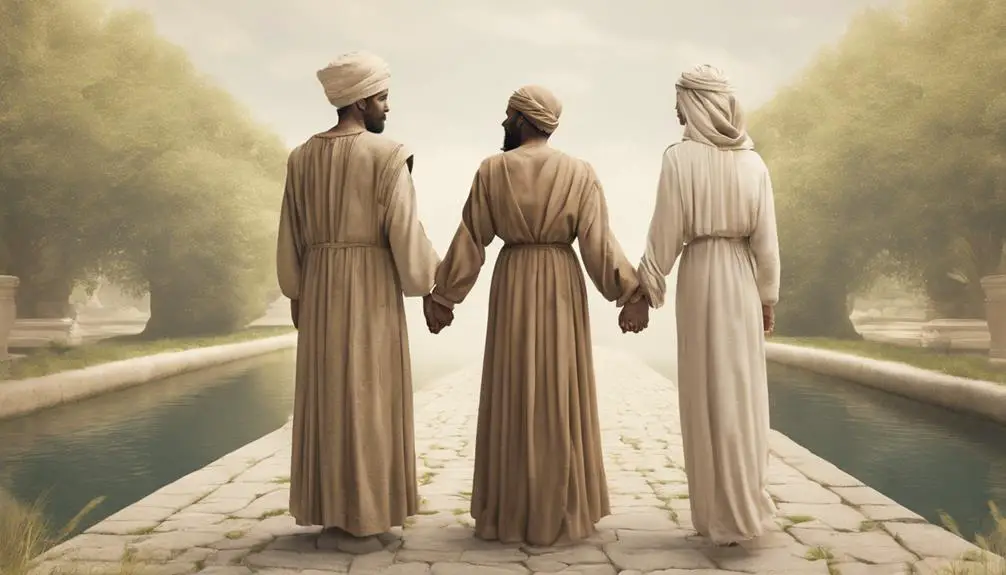
List of Married Couples in the Bible
Have you ever considered how the stories of married couples in the Bible might reflect on your own relationships?
From Adam and Eve's beginnings in Eden to the complex dynamics between Jacob, Leah, and Rachel, these narratives offer a rich tapestry of love, conflict, faith, and redemption. Each couple's journey provides unique insights into the human condition and divine interaction.
By exploring their stories, you're invited to uncover lessons that are as relevant today as they were thousands of years ago. Let's embark on this journey together, discovering timeless truths hidden within ancient tales.
Key Takeaways
- Biblical marriages often symbolize deeper spiritual and moral lessons, such as harmony, faith, and obedience.
- Complex family dynamics, including love, deception, and redemption, play crucial roles in biblical narratives.
- Key married couples in the Bible include Adam and Eve, Abraham and Sarah, Isaac and Rebekah, and Jacob with Leah and Rachel.
- These relationships underscore the intertwining of human action with divine will, shaping the legacy and faith of future generations.
Adam and Eve: Humanity's Foundation
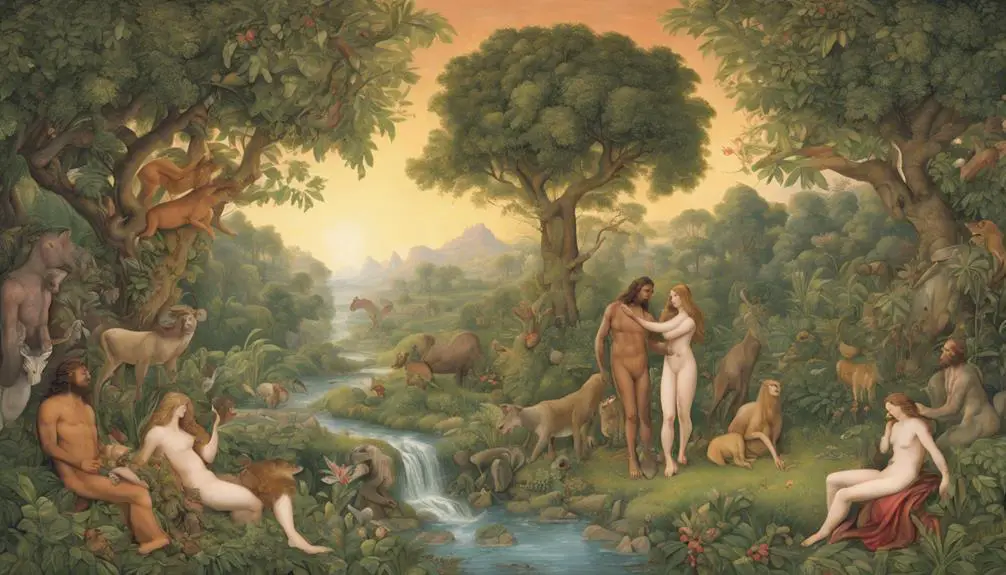
Adam and Eve, often regarded as the progenitors of humanity, mark the genesis of marital relationships within the biblical narrative. Their union, established in the serenity of the Garden of Eden, symbolizes the intended harmony between man and woman. However, this harmony is disrupted by the event of original sin, an act that fundamentally alters their relationship and sets a precedent for the complexities of marital relations in the human experience.
The narrative of original sin, involving the consumption of forbidden fruit, introduces a dichotomy of obedience and rebellion within the context of their marriage. It's crucial to understand that this act doesn't just signify disobedience to divine command but also represents the first instance of blame-shifting in a marital relationship. Eve is often cited as the one who was deceived, yet both bear the consequences of their actions, highlighting mutual accountability.
This foundational story, arising from the Garden of Eden, does more than recount the origin of sin; it reflects on the inherent challenges and responsibilities within a marital bond. The expulsion from paradise serves as a metaphor for the loss of innocence and the inevitable hardships that couples face, emphasizing the need for unity and resilience in overcoming life's trials.
Abraham and Sarah: A Journey of Faith

Moving beyond the foundational narrative of Adam and Eve, we encounter the story of Abraham and Sarah, a testament to the enduring faith and trials within a marital bond. Their journey together isn't only a physical migration but also a spiritual odyssey, marked by moments of doubt, laughter, and divine intervention.
In dissecting their story, you'll find:
- Sarah's Laughter: An emblematic response to God's promise of a child in their advanced age. This laughter, initially born of incredulity, transforms into a symbol of joy and faith.
- Hagar's Role: Introduces a complex layer to their marriage. Sarah's decision to give Hagar to Abraham as a surrogate mother tests their faith and exposes the intricacies of human relationships and divine promises.
- Trial of Faith: Their journey is punctuated by trials, from leaving their homeland to the ultimate test of faith—Abraham's commanded sacrifice of Isaac. These moments underscore their unwavering trust in God's promises.
- Covenant with God: Central to their story is the covenant, marking not only a divine promise to Abraham and Sarah but also establishing a foundational narrative for faith communities.
Analyzing Abraham and Sarah's story, you delve into a narrative rich with themes of faith, promise, and perseverance, offering profound insights into the complexities of faith-driven relationships.
Isaac and Rebekah: Love and Legacy
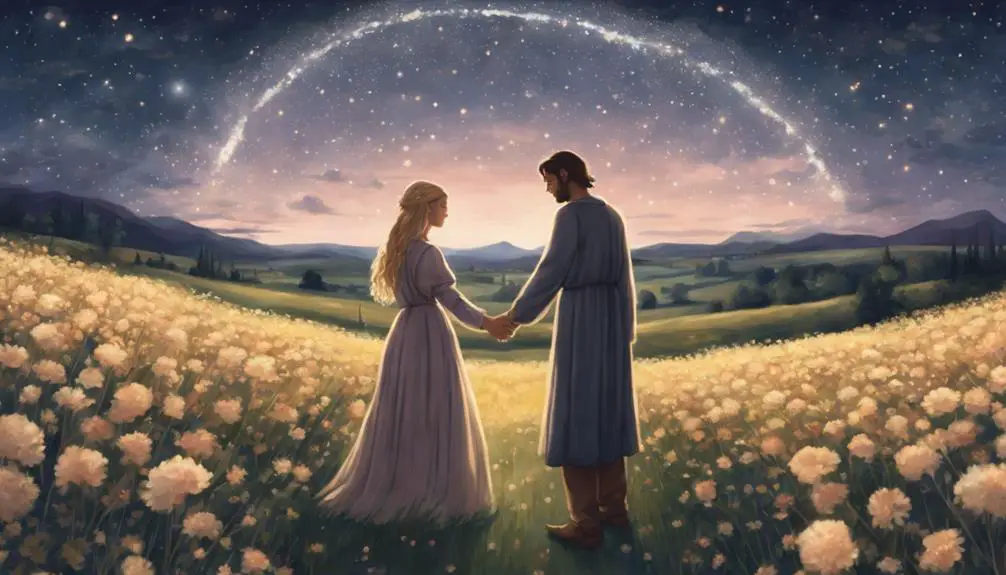
In the tapestry of biblical narratives, the story of Isaac and Rebekah weaves a complex pattern of love, divine intervention, and legacy. Their union, marked by Rebekah's initiative and Isaac's trust, stands as a testament to the intertwining of human action and divine will within the framework of biblical relationships.
Rebekah's initiative is evident from the outset; her willingness to leave her family, based on a servant's recount of divine guidance, underscores a proactive role rarely attributed to women in ancient texts. This decisiveness not only facilitated the fulfillment of a divine plan but also cemented her place in the lineage of the Israelites, showcasing her as a pivotal figure in biblical history.
Isaac's trust, manifest in his acceptance of Rebekah without prior acquaintance, highlights the depth of his faith in divine providence. This trust is further exemplified in his reliance on Rebekah's judgment later in their life together, particularly in matters concerning their offspring, thereby reinforcing the legacy of faith and obedience to divine will.
The narrative of Isaac and Rebekah, rich in themes of love, divine orchestration, and legacy, provides a nuanced exploration of the dynamics within a biblical marriage, where individual attributes and divine guidance interlace to fulfill a greater purpose.
Jacob, Leah, and Rachel: Complex Bonds
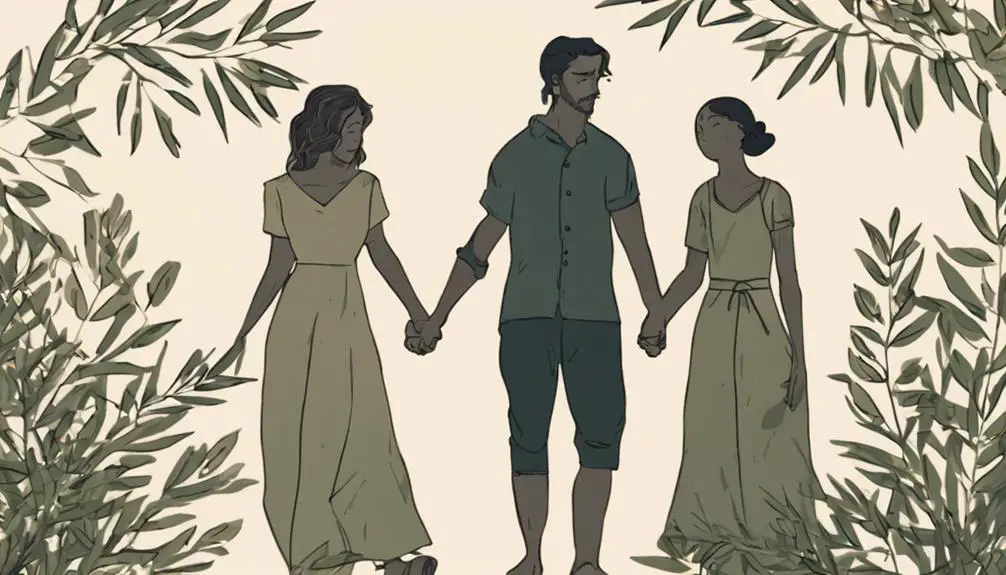
Among the myriad stories of marital relationships in the Bible, the tale of Jacob, Leah, and Rachel stands out for its intricate web of love, deceit, and familial obligations. The narrative isn't only a testament to personal desires and divine interventions but also a reflection on the complexities of human relationships, particularly within a marital context.
- Sibling Rivalry: The rivalry between Leah and Rachel, sisters who become co-wives to Jacob, serves as a poignant example of how familial ties can be tested. Their competition for Jacob's affection underscores the emotional and psychological complexities of their situation.
- Marital Deception: Jacob's marriage to Leah, orchestrated through Laban's deceit, sets the stage for a series of events marked by trickery and manipulation. This act of deception profoundly impacts the dynamics within this family unit.
- Familial Obligations: Despite the deception and rivalry, the narrative reveals a deep sense of duty and responsibility towards family. Jacob fulfills his obligations, working additional years to marry Rachel, the woman he loves.
- Complex Bonds: The relationships between Jacob, Leah, and Rachel illustrate that love, duty, and deception can coexist, creating bonds that are as complex as they're deep.
Boaz and Ruth: Redemption and Love
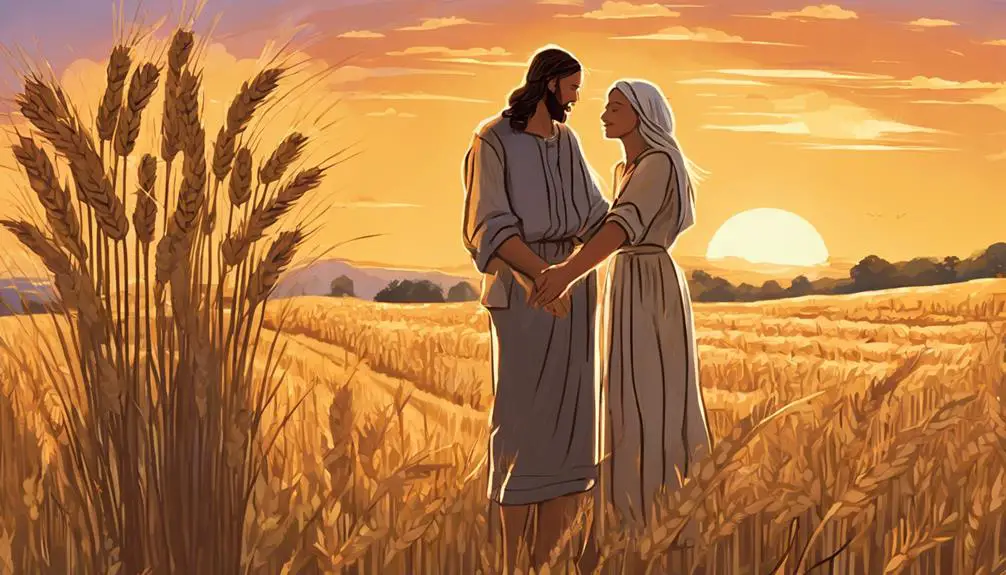
Shifting focus to another profound biblical narrative, the story of Boaz and Ruth exemplifies not only the themes of redemption and love but also the enduring power of loyalty and providence within the context of marital bonds. Their union, deeply embedded in the cultural context of ancient Israel, showcases the kinsman-redeemer principle, where Boaz takes Ruth, a Moabite widow, as his wife to preserve the lineage of her deceased husband.
Aspect |
Description |
Significance |
|---|---|---|
Cultural Context |
Rooted in the Judaic law of Levirate marriage |
Highlights the societal norms and religious obligations of the time |
Redemption |
Boaz redeems Ruth, elevating her status |
Demonstrates the transformative power of love and kindness |
Genealogical Significance |
Their union leads to the lineage of King David |
Pivotal for understanding the messianic lineage in Christian theology |
This narrative isn't just a tale of romance but a complex interplay of duty, love, and divine providence. It provides invaluable insights into the societal structures and personal relationships of ancient times, underscoring the genealogical significance of Boaz and Ruth's marriage not only for their immediate community but for the broader theological narrative.
Frequently Asked Questions
How Did Cultural Norms of the Time Influence the Dynamics of These Biblical Marriages, and How Might Those Norms Differ From Modern Understandings of Marriage?
Cultural norms of the time heavily influenced marital dynamics, emphasizing economic transactions and polygamy practices. Unlike today's emphasis on love and partnership, marriages then often served as strategic alliances. Economic benefits, rather than emotional connections, guided unions, while polygamy, accepted in various societies, contrasts sharply with modern monogamous ideals.
These historical practices highlight how cultural perceptions of marriage have evolved, shifting from economic and social strategies to personal choice and mutual affection.
In What Ways Did the Roles of Women Within These Marriages Reflect the Societal Values and Religious Beliefs of Ancient Times, and How Have Perceptions of These Roles Evolved Over Time?
You're diving into how gender roles within marriages showcased societal and religious values of ancient times. Initially, women's roles were largely confined, reflecting economic and religious norms.
Today, perceptions have evolved significantly, recognizing women's equal potential in societal contributions. This shift mirrors broader societal changes, moving away from rigid gender roles towards more equitable partnerships.
The economic impact of these evolving roles has also been profound, reshaping family structures and societal expectations.
Can We Find Any Instances Where These Biblical Couples Faced Challenges or Conflicts Within Their Marriage That Were Resolved Through Communication or Divine Intervention, Outside of the Well-Known Narratives Detailed in the Sections?
You'll find that conflict resolution strategies and divine intervention examples in biblical narratives often highlight deeper lessons.
While the well-known stories grab attention, it's in the quieter moments between couples where you see true resolution emerge, sometimes through direct communication, other times through divine nudges.
These instances reflect a complex interplay of faith, personality, and circumstance, offering a rich tapestry of insights into overcoming adversity within a partnership.
How Do Scholars and Theologians Interpret the Significance of These Marriages in the Context of Broader Biblical Themes, Such as Covenant, Faith, and Redemption, Beyond the Individual Stories?
You'll find scholars and theologians often interpret marriage symbolism and prophetic allegories in the Bible as reflecting broader themes like covenant, faith, and redemption.
They dive deep into these narratives, analyzing how marriages aren't just personal stories but are emblematic of God's relationship with humanity.
Through these unions, intricate connections between divine promises and human experiences are uncovered, offering a richer understanding of biblical messages on a grand scale.
Are There Any Documented Traditions or Rituals Associated With Marriage in the Biblical Era That These Couples Might Have Observed, Which Are Not Explicitly Mentioned Within the Stories of the Sections Outlined?
You're diving into whether there are unmentioned traditions or rituals in biblical marriages.
Yes, beyond the narratives, scholars infer the existence of wedding feast customs and dowry practices, integral to the era's matrimonial culture. These elements, while not explicitly detailed, likely shaped the matrimonial landscape, providing a richer understanding of the societal and religious framework within which these unions occurred, and offering insight into the broader themes of covenant and faith.
Conclusion
In summarizing the relationships of these Biblical couples, it's evident that their stories transcend mere historical accounts, embodying profound theological and moral lessons.
The complexities, challenges, and triumphs within these unions reveal a divine orchestration and the pivotal role of faith, love, and commitment.
Analyzing these narratives offers valuable insights into the essence of human relationships and their significance in the broader spiritual and cultural context.
Thus, these couples' legacies continue to influence contemporary understandings of partnership and faith.


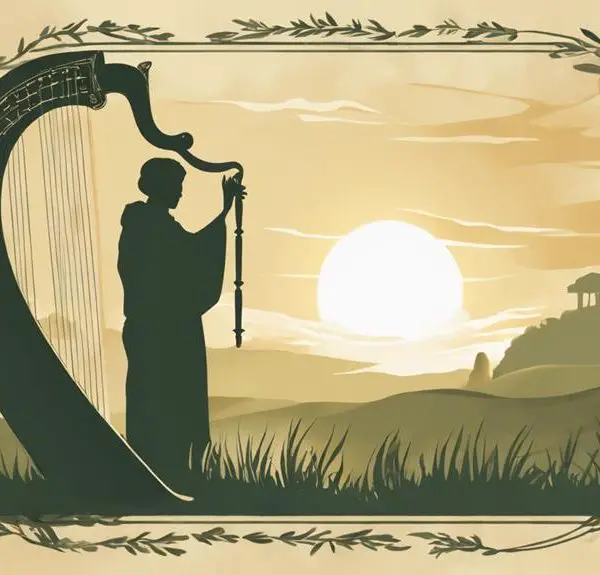
Sign up